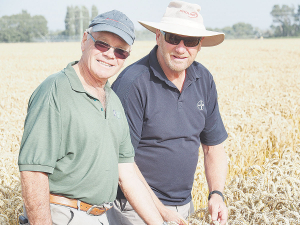Arable advocacy?
OPINION: Spare a thought for the arable farmer, squeezed on one side by soft global prices and on the other by limits on further yield increases.
 Ashburton wheat grower Eric Watson, left, with Bayer’s David Weith in the paddock of wheat which has yielded a new world record. Photo: Supplied.
Ashburton wheat grower Eric Watson, left, with Bayer’s David Weith in the paddock of wheat which has yielded a new world record. Photo: Supplied.
Going to liquid fertiliser is the big innovation that allowed Mid-Canterbury arable farmer Eric Watson to break his own Guinness World Record for wheat yield.
Watson, who farms 490ha at Wakanui, near Ashburton, produced 17.398 tonnes per hectare to beat his own previous record of 16.791t/ha set in 2017.
Bayer regional business manager for Mid & South Canterbury, David Weith, who handled all the agronomy for the record crop, praised Watson’s attention to detail and constant striving to improve.
“What he does differently to everybody else is attention to detail and his skill to get his timings and everything else right,” he told Rural News.
However, Weith says the game changer was the move to liquid urea – Watson introduced a 48m spray boom applicator to replace his 32m granular fertiliser spreader.
“In 2017, we had a beautiful crop but it was strippy and there was huge variation in yield between runs of the fertiliser spreader,” Weith explained
He says granular fertiliser is handled multiple times before getting to the farmer, making the pellets highly variable and difficult to get a consistent spread.
“The target audience [for fertiliser] now is the dairy farmer who is probably spinning to 12m – when cropping farmers are trying to spread to 24 or 32 metres and they’re just not getting there.”
Weith believes that Watson buying that sprayer and going to liquid meant it “evened the fields up dramatically.”
The record crop used liquid urea produced and stabilised by Molloy Agriculture using Ravensdown-supplied urea.
Watson told Rural News that the liquid sprayer produced an even spread, and even quite high winds didn’t distort the pattern at all.
“That’s a huge advantage in Canterbury,” he says.
Watson also added that it had also been a very good arable season.
“It was probably one of the best we’ve had for years, not too hot and just dry enough.”
Watson did not want to rest on his laurels after the 2017 record.
“We saw ways in which we could make improvements and achieve an even higher yield.
“By trying new cultivars, switching to liquid nitrogen and monitoring plant health more regularly we were able to achieve another incredible result,” he says.
“Because of the high wheat yields we can grow on our farm, we are pleased if we see yields increase year-on-year by 100-200 kg/ha. So, to beat my last crop by almost 600 kg/ha exceeded even my hopes.”
Watson’s advice to other farmers is attention to detail and making sure all the inputs are right, while being careful not to overspend.
Working alongside Watson and Bayer was a team including: PGG Wrightson Rural Supplies, Yara Fertilisers, SGS, Davis Ogilvie and Hill Laboratories.
Planted in April 2019 and harvested on February 17, the wheat variety used was Kerrin, primarily a stock food variety, bred by KWS and supplied by Carrfields Grain & Seed.
Constant improvement
David Weith says when he started in the industry, a normal wheat yield was about 4t/ha.
However, he believes a visit by some UK farm consultants to NZ 15 years ago turned it on its head with new methods around sowing and controlling diseases and pests.
“That brought about a ‘quantum leap’ in yield, to 8t/ha, then 10t/ha,” Weith claims.
Now, most people are “relatively satisfied” to achieve 12t/ha on irrigated land, while some get a little more.
“But the average is still around 12 tonnes,” he adds. “To me, we shouldn’t be happy with that because we can make a hell of a lot more money out of cereals if we get into yield, because yield is king.”
Weith told Rural News that Bayer is focused on improving yields through innovative products and crop management.
“Our aim is to assist New Zealand to sustainably become the highest yield producing country in the world.”
Horticulture New Zealand (HortNZ) has added its perspective to numerous primary sector voices urging the Government to strengthen its draft legislation to replace the Resource Management Act (RMA).
The Commerce Commission has finalised new information disclosure requirements for local councils and water organisations that deliver water supply and wastewater services.
Beef + Lamb NZ (B+LNZ) is calling for significant changes to the Government’s reforms to the Resource Management Act (RMA).
NZPork says the Government needs to strengthen its proposed planning laws to ensure New Zealand's pig farmers can continue to produce pork.
Good news for kiwifruit growers - a record crop with forecast per hectare returns at record levels for all fruit categories for the 2025-26 season.
As guests gathered on what is known as the Speaker's Lawn - a beautifully manicured patch of grass behind the main buildings of Parliament - to mingle and enjoy a lamb chop to celebrate National Lamb Day, the mood was very much upbeat.